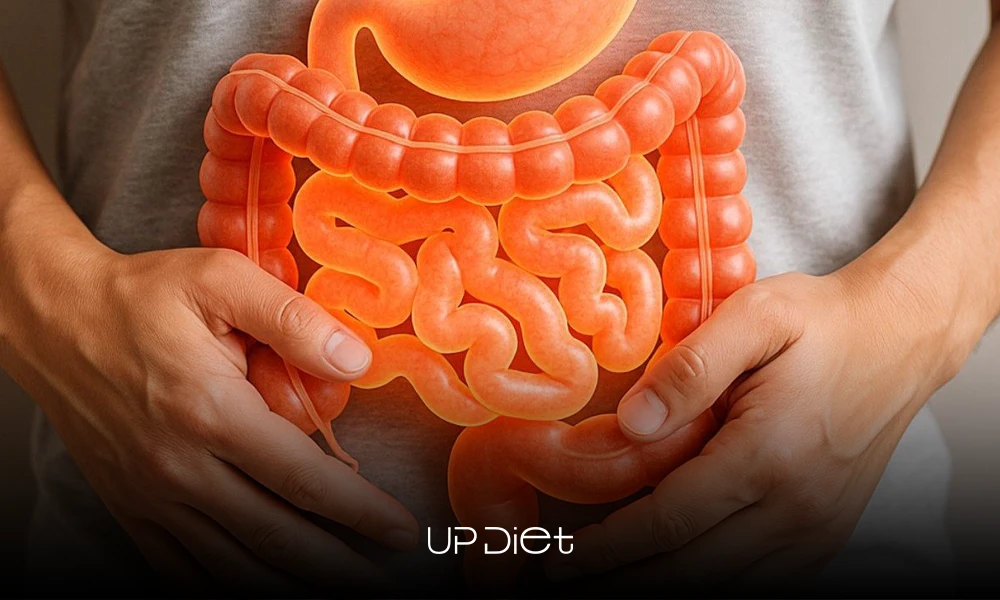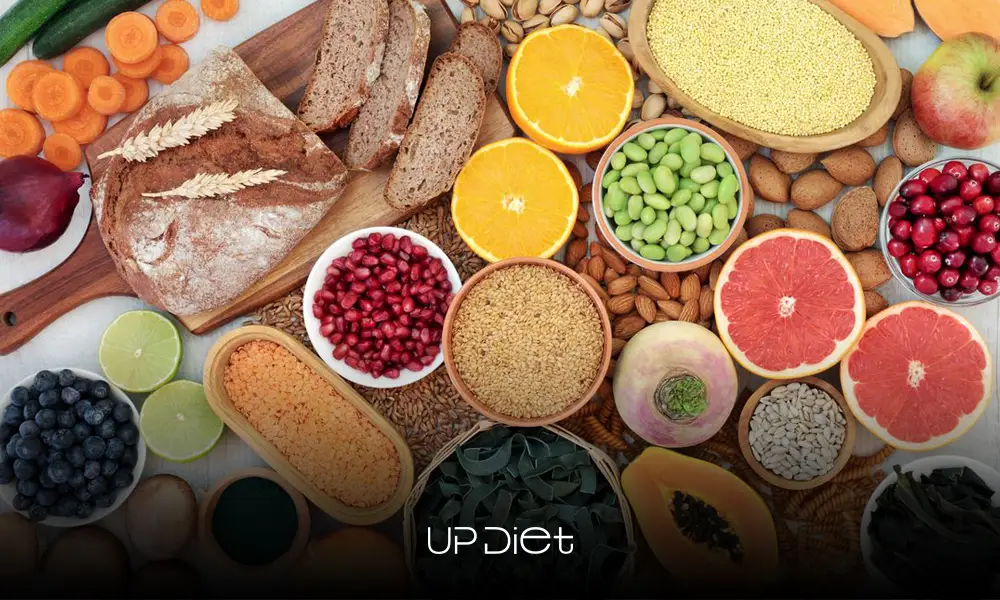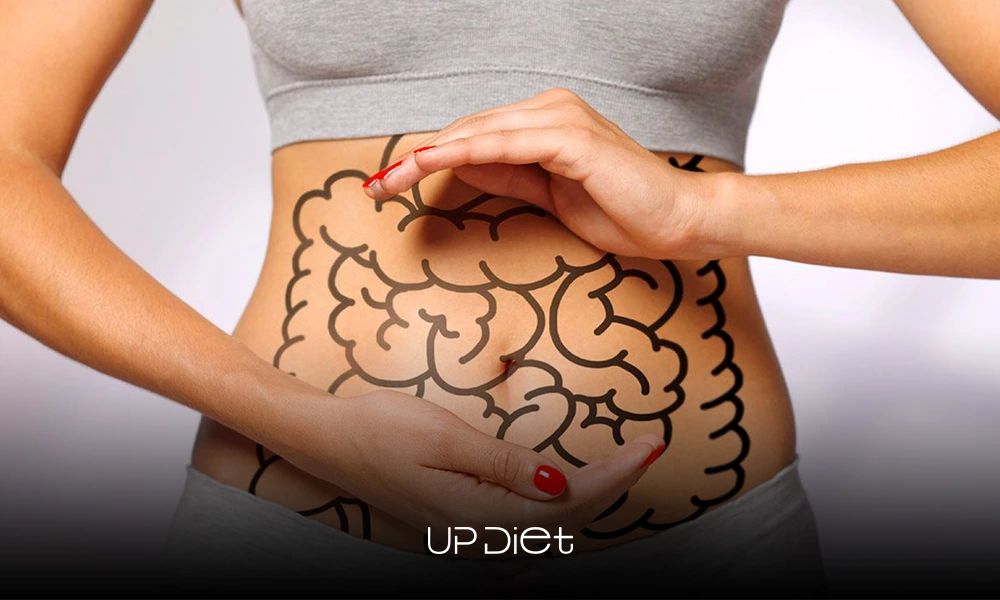Get a plan made for your unique body and goals
Diet for Slow Digestion: How to Improve Motility and Reduce Bloating Naturally

According to the American Gastroenterological Association, 40% of Americans say digestive problems disrupt their daily lives, and 1 in 3 even won’t mention symptoms unless a doctor asks first. That may be why searches for better digestion have spiked.
These diets target slow digestion, which is often felt as bloating, sluggish gut motility, or constipation. In this article, you’ll learn the leading causes of this issue, plus the best foods and habits to keep everything regular.
Why Does Slow Digestion Happen?
Slow digestion usually comes from a handful of common, fixable factors. Here are the mechanisms that matter most:
- Low Fiber: Fiber is your gut’s cleaning crew. Insoluble fiber adds bulk to stool and helps it move, while soluble fiber feeds good bacteria that produce compounds (like SCFAs) which keep gut muscles active. When fiber is too low, digestion slows, stools become dry/hard, and bloating is more likely.
- Dehydration: Even mild dehydration slows digestion. Why? Because your gut needs water to soften food and stool. Without enough water (especially when fiber intake is high), the colon pulls more water out of the stool, making it harder and more uncomfortable to pass.
- Slow Motility (Sluggish Gut Muscles): Your digestive tract moves food using wave-like muscle contractions. When these contractions slow down, food sits longer in the stomach or colon, causing gas, bloating, and constipation.
- Stress: Chronic stress negatively impacts the gut-brain connection and triggers the “fight or flight” response. This condition slows digestion and transit because it’s no longer a priority for your body.
- Low Physical Activity: Sedentary days slow stool movement and allow more gas to build up. But moving your body helps everything move (including your intestines) and reduces the need for a better diet for digestion.
- Microbiome Imbalance: Your gut bacteria help break down food, produce motility-supporting compounds, and regulate inflammation. If the microbiome is out of balance (due to stress, antibiotics, etc.), bloating and sluggish digestion shouldn’t surprise you.
- Medical Causes: Although less common, severe, sudden, or persistent symptoms may be linked to gastroparesis, thyroid imbalances, nerve issues (such as uncontrolled diabetes), or certain medications (opioids, GLP-1s, anticholinergics).

Foods That Support Better Motility
Every diet for slow digestion focuses on encouraging motility by feeding healthy gut bacteria and stimulating (regular) movement without overloading a sluggish system. The best foods for this goal include:

Foods That Can Worsen Slow Digestion and Bloating
A diet for poor digestion avoids foods that irritate the gut and cause bloating, constipation, or other issues. Here are some of the foods that you need to limit, especially if gut motility is already compromised:
- Large portions of high-fat, heavy meals
- Greasy, fried foods
- Highly processed foods (packaged snacks, refined carbs, sugary foods/drinks)
- Too many caffeinated and carbonated drinks
- Excessive alcohol
- Personal sensitivities and trigger foods, such as dairy, high-fructose fruits, and spicy foods.
- Too much sugar alcohol (found in sugar-free products or certain fruits/vegetables)
- Fiber-rich foods without drinking enough water
Evidence-Based Habits Beyond Diet
Better diet strategies are powerful, but lifestyle and behavioral habits are also vital for regulating digestion. Here are some practical, non-food interventions to heal slow gut motility:
- Eat slowly and chew properly. This way, you'll reduce the workload on your stomach and minimize swallowing air (which causes bloating).
- Practice mindful eating. Sitting down and avoiding distractions improves your parasympathetic, AKA rest-and-digest, responses.
- Hydrate with fluid spacing in mind. Aim for about 2 liters throughout the day; sip slowly to keep your system always lubricated. You can also drink some water when eating (no, it doesn't disturb digestion; it can even aid it. More info on USA Today fact check).
- Include physical activity as part of your diet to improve digestion. Harvard recommends 150 to 270 minutes of moderate exercise per week. But even a 15-minute walk after meals can stimulate gut muscles.
- Pay attention to meal timing and maintain a regular rhythm. Space your meals 3 to 4 hours apart; eat early, light dinners 2 to 3 hours before going to bed; and avoid constant snacking so your digestive system doesn't have to work all the time.
- Manage your stress to protect your gut. Try slow breathing, meditation, grounding exercises, or other evidence-backed methods to regulate your nervous system and, subsequently, your digestive system.

When Personalized Nutrition Is Helpful
Slow-digestion diets are helpful. But personalized nutrition becomes especially valuable when:
- Symptoms persist: If you’ve tried general dietary/lifestyle guidelines for a few weeks and still feel constant fullness, bloating, nausea, or irregular bowel habits, you may have gastroparesis or a motility disorder.
- There’s an underlying condition: If you have diabetes, take certain medications, have functional GI disorders, or have had GI surgery, then your motility may have altered significantly, making personalized nutrition necessary.
- Building sustainable habits is challenging: When generic guidelines fail to consider your lifestyle, preferences, intolerances, and even your unique microbiome, personalization can help.
Your options for getting custom guidance include registered dietitians, gastroenterologists, microbiome testing, symptom-tracking apps, or hybrid approaches like UpDiet (a combination of microbiome/DNA test with structured meal plans).
Final Thoughts: Better Digestion Diet Wins in Dual Approaches
Slow motility can’t be fixed overnight, even if you’re equipped with the best diet for poor digestion. The most effective strategy is to pair dietary changes with lifestyle habits. With both, you’ll notice a big difference over time, and without either one, your gains may be limited.
- In this post:
- Why Does Slow Digestion Happen?
- Foods That Support Better Motility
- Foods That Can Worsen Slow Digestion and Bloating
- Evidence-Based Habits Beyond Diet
- When Personalized Nutrition Is Helpful
- Final Thoughts: Better Digestion Diet Wins in Dual Approaches



